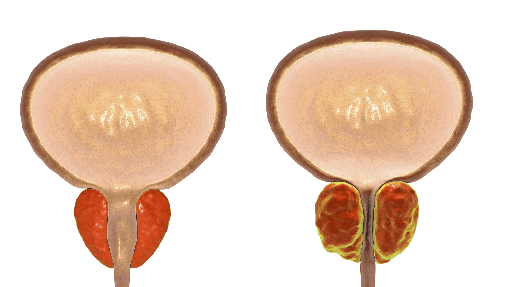What is Benign Prostatic Hyperplasia (BPH)?
BPH, benign prostatic hyperplasia, is a condition in which the prostate is enlarged. With BPH, there is an overgrowth of prostate tissue which pushes against the urethra and the bladder, blocking the flow of urine.

Normal Prostate (left) vs Enlarged Prostate (right)
Diagnosis & Treatment
A doctor may do a number of things to find the cause of urinary problems, including: taking a medical history and description of symptoms; a physical examination; blood or urine tests; and sometimes ultrasound or digital rectal exam.
A wide variety of treatment options are available for BPH, including:
- Watchful waiting if symptoms aren’t too bothersome and no complications arise.
- Behavioral modification, such as drinking fewer liquids before bed, drinking less caffeine and alcohol, or avoiding over-the-counter medications such as decongestants or antihistamines that can make prostate problems worse.
- Medication may help to minimize symptoms or growth of the prostate when symptoms become more advanced.
- Minimally invasive therapies are available when medication alone does not relieve symptoms of BPH, or when patients prefer not to take pills daily or experience medication-related side effects.
- Surgery is sometimes necessary for larger prostates or medically complicated patients.
-
Medication is the most common first-line treatment for mild to moderate symptoms of prostate enlargement; however, minimally invasive or surgical therapy might be recommended if symptoms are moderate to severe, medication doesn’t relieve the symptoms, or the patient would like to stop the medication.
Are You Curious If You May
Be Struggling With BPH?
Take the BPH Quiz >>
Take the International Prostate Symptom Score (IPSS) quiz to see if your symptoms could lead to BPH.
FAQs >>
Have questions about BPH? Visit our FAQ page to get answers.
How Does It Work >>
Learn more about the procedure to help BPH.
Questions For Your Doctor >>
Find out the questions you should ask your doctor.